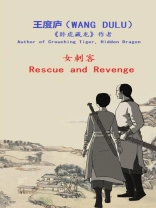Dulu Wang (1909-1977), was a famous Chinese Chivalry (Martial Art) novelist in the nineteen thirties and forties who wrote many novels including Crane-Iron Pentalogy (Dancing Crane, Singing Phoenix舞鹤鸣鸾记 aka鹤惊昆仑, 1940; Precious Sword, Golden Hairpin宝剑金钗, 1938; Sword Spirit, Pearl Light剑气珠光, 1939; Crouching Tiger, Hidden Dragon 卧虎藏龙, 1941; and Iron Knight, Silver Vase 铁骑银瓶, 1942) which was adapted into a film under the title ‘Crouching Tiger, Hidden Dragon’by Ang Lee and his colleagues in 2000. Its spectacular action, rhapsodic landscapes and tragic romance have touched audiences in Asia, North America and around the world and won over 40 awards and was nominated for 10 Academy Awards, including Best Picture, and won Best Foreign Language Film, Best Art Direction, Best Original Score and Best Cinematography. In 2019, the film was ranked the 51st in 100 best films of the 21st century list by Guardian.
Dulu Wang is considered one of the five greatest wuxia (which literally means ‘martial hero’) fiction writers of the Northern School in the Republican. He was less interested in writing about ruthless killings; instead, he focused on his characters’ development, their emotions, friendship, and passions. Wang had great sympathy for women who suffered cruel oppression by the society and imperial autocracy, and his novels featured many strong female characters, warriors, and heroines. Most of his stories featured tragic endings. His perfect combination of chivalry, romance and tragedy in his novels have thrilled many critics and readers and this style has influenced many authors. During 1925-1949 Wang published more 90 novels and thousands of articles and poems. Many of Wang’s books will be published in the Collected Works of Dulu Wang.
Rescue and Revenge (女刺客) was published through a newspaper (平报, Ping Bao) from June 19 to October 5, 1928. The story occurred in Late Qing Dynasty. Tang, a retired local governor who hated the incompetent and corrupt empire, was imprisoned and tortured to death because of his words. Xu, a wuxia hero decided to protect Tang’s orphan, a 15 year’s old daughter, Qing and to kill the two cruel officials, Prince Mu and Lu, the Vice Minister of Penal Department, who murdered Tang and numerous innocent people. Xu killed Mu, but unfortunately was injured during a fight and dead. Qing had no choice but to take matters into her own hands. She went to Lu’s mansion, killed Lu, avenged his father and Xu she loved. Then she killed herself.
王度庐是中国著名的武侠言情小说作家,在上个世纪三四十年代曾发表过大量小说、杂文、诗词等作品。《鹤惊昆仑》、《宝剑金钗》、《剑气珠光》、《卧虎藏龙》、《铁骑银瓶》是王度庐创作的五部内容相互关联,又各自独立的武侠悲情小说,通常被合称为’鹤-铁五部’。2000年李安导演根据该系列改编的电影《卧虎藏龙》,曾获得40多个国际电影大奖,并荣获了第73届奥斯卡最佳外语片等四项大奖。本社出版的《王度庐选集》,收入了王度庐先生的包括’鹤-铁五部’在内的不同时期不同类型的部分作品,王宏并对其做了一些必要整理和订正。《女刺客》是1928年6月19日至10月5日在北京平报上发表的。所述故事发生在晚清,一个痛恨无能和腐败的朝廷和恶吏,已经隐退的知府唐竹禅,因为酒后所作的一首诗而被监禁并折磨致死。侠客徐凌鹏得知后便决定暗中保护唐的孤女,15岁的女儿蝶卿,并除掉杀害了唐和无数无辜的平民的两个官员:皇叔穆亲王和刑部侍郎卢静舟。徐杀了穆,但不幸在一场战斗中受伤而死。蝶卿失去了保护自己,为自己报杀父之仇,并且自己又深爱的人,身心俱焚,别无选择,只能乔装来到卢家,刺杀了卢,然后自杀。
Tabella dei contenuti
出版说明(Preface)
序 (Foreword)
第一章 遣芳春狂士触文网 构奇祸孤女寄人篱
第二章 遭白眼愁碎阿侬心 惊绝艳销煞荡子魄
第三章 江水一湾侠士仗义 泪丝万缕孝女思亲
第四章 两不相识探监凭侠骨 一场没趣求婚使奸心
第五章 生死别起解京都道 忠烈心救护冤枉人
第六章 炎凉世态堪使豪杰愤 潦倒病榻备受美人怜
第七章 徐凌鹏大闹侍郎第 唐竹禅瘦死刑部监
第八章 两虎相搏非伤即死 千秋遗恨抚冢销魂
跋 – 寻找父亲的足迹 (Epilogue)
已知王度庐著作目录 (Bibliography)
Circa l’autore
王度庐出生于北京一个贫困的旗人家庭,七岁丧父,无力求学,只断断续续读过几年书,但是他勤奋好学,爱好诗词。中学未毕业就担任教师和报章编辑。经常到北京大学旁听,到北京图书馆自学。1926年代开始写作长篇小说,着有《鹤惊昆仑》、《宝剑金钗》、《卧虎藏龙》、《铁骑银瓶》、《剑气珠光》、《紫凤镖》等五十余部作品,与李寿民、宫白羽、郑证因、朱贞木被誉为「北派五大家」。1949年移居辽宁,在沈阳辽宁省实验中学任教,1977年病逝。王度卢的作品将侠义精神与爱情故事融为一体,并常常以悲剧为结局,对后世武侠小说影响很大。2000年,由台湾著名导演李安执导,根据王度庐的《卧虎藏龙》改编,由周润发、杨紫琼、章子怡、张震等主演,拍摄了《卧虎藏龙》电影。该电影大获成功,获第73届奥斯卡包括最佳影片在内的10项提名,获4项奖(最佳外语片、最佳艺术指导、最佳原创配乐和最佳摄影)。获3项金球奖提名,其中两项获奖(最佳导演奖和最佳外语片)。这是华语电影历史上第一部荣获奥斯卡金像奖最佳外语片的影片。《卧虎藏龙》电影在西方尤为受到广泛的好评。世界总票房为2.1亿美元,其中美国为1.3亿,打破了美国外国语电影票房的历史记录。












